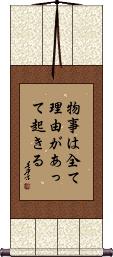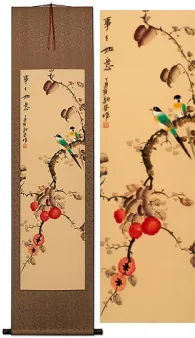Many custom options...
And formats...

Everything Happens for a Reason in Chinese / Japanese...
Buy an Everything Happens for a Reason calligraphy wall scroll here!
Personalize your custom “Everything Happens for a Reason” project by clicking the button next to your favorite “Everything Happens for a Reason” title below...
Everything Happens for a Reason
物事は全て理由があって起きる means everything happens for a reason.
However, this is a work in progress. We're still trying to decide the best way to express this in Japanese. If you order this, we might have a discussion about the best version that fits you. Here's how the characters break down by meaning (keep in mind, Japanese grammar and sentence construction is very different from English, so it doesn't make complete sense in English)...
物事 = things, everything
は particle
全て all, the whole, entirely
理由 reason
が particle
あっ be, exist, have, take place, happens
て particle
起きる to occur, to happen; to take place (usually unfavorable incidents)
Note: Because this selection contains some special Japanese Hiragana characters, it should be written by a Japanese calligrapher.
Everything Happens for a Reason
萬事皆因果 means “Everything happens for a reason” in Chinese.
The first two characters mean “all things” or “everything.”
The middle character kind of means “in all cases.”
The last two characters create a complex word that can be defined in many ways, such as “karma,” “cause and effect,” “fate,” and “every cause has its effect, as every effect arises from a cause.”
Keep in mind that Chinese grammar is a bit different than English, so trust me that this makes a natural-sounding proverb in Chinese.
This in-stock artwork might be what you are looking for, and ships right away...
Gallery Price: $108.00
Your Price: $59.88
Bathing Lady
Chinese Modern Art Painting
Discounted Blemished
Gallery Price: $26.00
Your Price: $14.00
Gallery Price: $100.00
Your Price: $35.00
Beautiful Chinese Woman Modern Art Painting
Discounted Blemished
Gallery Price: $31.00
Your Price: $17.00
Gallery Price: $87.50
Your Price: $34.00
Gallery Price: $49.00
Your Price: $27.00
Gallery Price: $42.00
Your Price: $23.00
Chinese Mountain Cliff Village Landscape Painting
Discounted Blemished
Gallery Price: $38.00
Your Price: $21.00
Chinese Mountain Cliff Village Boat and Bridge Landscape Painting
Discounted Blemished
Gallery Price: $38.00
Your Price: $21.00
Gallery Price: $71.00
Your Price: $39.00
The following table may be helpful for those studying Chinese or Japanese...
| Title | Characters | Romaji (Romanized Japanese) | Various forms of Romanized Chinese | |
| Everything Happens for a Reason | 物事は全て理由があって起きる | monogoto ha subete riyuu ga at te okiru monogoto ha subete riyu ga at te okiru | ||
| Everything Happens for a Reason | 萬事皆因果 万事皆因果 | wàn shì jiē yīn guǒ wan4 shi4 jie1 yin1 guo3 wan shi jie yin guo wanshijieyinguo | wan shih chieh yin kuo wanshihchiehyinkuo |
|
| In some entries above you will see that characters have different versions above and below a line. In these cases, the characters above the line are Traditional Chinese, while the ones below are Simplified Chinese. | ||||
Successful Chinese Character and Japanese Kanji calligraphy searches within the last few hours...




















